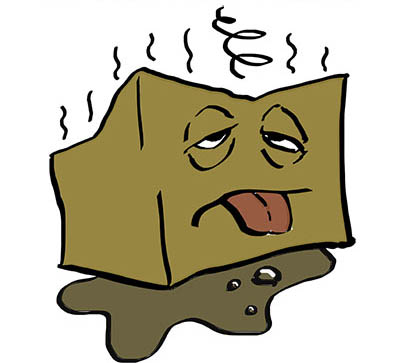Don’t ignore odors coming from your septic tank. Solve them or the problem will only get worse!
If you have a septic tank, you should be able to use it problem-free, for years. However, it’s not unusual to experience septic odor problems with a septic system. Regular septic tank maintenance is vital to long-term, trouble free septic tank operation.
How do septic tanks work?
In some areas without a local sewer system, land owners are have to install their own septic tank systems to deal with sewage and wastewater. A septic tank is a tank made of steel or concrete that is buried under the ground. The wastewater flows into the tank and builds a layer of “scum” at the top and heavier waste sinks to the bottom. Water rests in between the scum, and the layer of sludge at the bottom.
As wastewater flows into the tank, the wastewater already in the tank flows out. This water flows to a drainage field, called a “leach field”. A leach field consists of perforated pipes resting in trenches. Typically, gravity is used to transport the wastewater away from the dwelling, where it is absorbed by the ground in the area of the leach field. If the septic tank system does not perform properly, it can contaminate the area, costing thousands of dollars to clean up.
What causes of septic tank odor problems
If a septic tank system is working well, gases from the treatment process are contained and vented in a controlled manner. Septic odor problems occur when a septic tank system is not functioning properly and sewage gases are released in ways that are not intended by its design. Some of the common causes of odors include:
Septic tank system that’s too full: This could be caused by a faulty pump, a blocked outlet pipe to the leach field or too many solids building up in the bottom of the tank.
Dry drains in your house: Drains and toilets will have a small amount of water in them that prevents sewage gases from seeping from the pipes and septic tank back through them into the house. When a drain is dry, there is nothing to stop the gases from entering the home or dwelling. You’ll notice a foul odor inside your home if this happens.
Blocked septic venting systems: Without a working venting system, sewage gases can’t escape from the septic system. It’s possible that this situation can lead to a toxic hazard to home occupants, and even pose the threat of flammability. Blocked vents can be caused by new landscaping or Ice or frost. When this happens, sewer gases must escape somewhere and often find their way back into the home. Like the dry drain scenario, you may smell odor in the house but you may also notice odors outside the home, too. If you suspect this condition, inspect the outdoor plumbing vents, and clear them as necessary.
How to prevent septic odor problems
One word: MAINTENANCE. The best way to avoid septic tank odor problems is to schedule regular maintenance for the septic system equipment. Clearing out solids is a crucial part of keeping your septic system in good condition. Maintaining your septic system should include:
- Conducting regular full-scale inspections of mechanical equipment (pumps and float switches), vents, drains in the house and checking for leaks.
- Evaluating the leach field for possible scum and sludge flowing out of the septic tank (there should be none). If there is solids present, your septic tank is likely full and needs to be pumped out.
- Remove or reduce the solids in the septic tank by either pumping or the regular use of microbes to digest them. Many septic system owners have had success with converting their septic tank into an aeration basin by installing an aeration system and using microbes or bio-enzymes. By doing this, the solids are consumed by the microbes and do not have to be pumped out.
Other ways to prevent septic odor problems
- Install activated carbon air filters on all vents. Air that escapes the vents can be filtered before it is released to the surrounding environment.
- Install an activated carbon air filter with a vacuum system. A system like this will pull the air out of the septic tank and direct it through a large activated carbon air filter. You will need to make sure there is a way for air to get in the tank since this system will be pulling air out.

